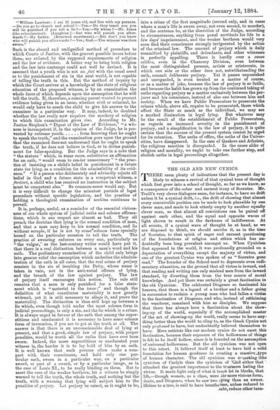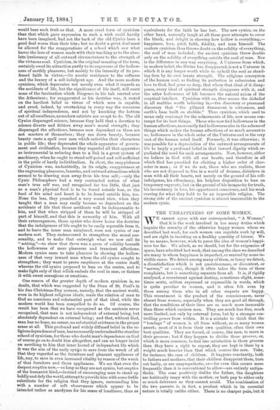THE OLD AND NEW CYNICS.
THERE seem plenty of indications that the present day is likely to witness a revival of that cynical tone of thought which first grew into a school of thought, so far as we know, as a consequence of the sober and earnest irony of Socrates. Mr. Traill's very clever dialogues seem, for instance, to have no drift unless it be a cynical drift, i.e., the drift of showing that almost every conceivable position can be made to look plausible by one clever man, and made to look utterly empty by another equally clever man, so that almost all convictions can be paired off against each other, and the equal and opposite waves of light shown to result in the darkness of indifference. At all events, if a cynical wave of thought be at hand, as we are disposed to think, we should ascribe it, as in the time of Socrates, to that spirit of eager and earnest questioning of the foundations of religion and ethics which has un- doubtedly been long prevalent amongst us. When Cynicism first appeared in the world, it was professedly grounded on a depreciation of everything except the majesty of virtue, and one of the greatest Cynics was spoken of as " Socrates gone mad." The founder of the School used to deprecate even rudi- mentary education, on the ground that all virtue is inward, and that reading and writing can only mislead men from the inward standard, by diverting them from the true source of moral knowledge. And yet there was certainly a 'great fascination in the old Cynicism. The celebrated Diogenes so fascinated his hearers, that there is a legend of a brother and a father going in succession to reclaim a young man who had fallen a victim to the fascination of Diogenes, and who, instead of reclaiming the wanderer, remained with him as disciples. We suppose that there has always been a fascination about the show- ing-up of the world, especially if the accomplished master of the art of showing-up the world, really seems to have any- thing better than the world to cling to, as the Greek Cynics not only professed to have, but undoubtedly believed themselves to have. Mere satirists like our modern cynics do not exert this fascination, because their exposure of the hollowness of things is fell to be itself hollow, since it is founded on the assumption of universal hollowness. But the old cynicism was not open to this retort. It believed itself at least to have laid a solid foundation for human goodness in creating a massive...-type of human character. The old cynicism was nv-aiaking ithe
cynicism of Carlyle than the cynicism of vlad either that attached the greatest importance to the trrarmers hating the virtue. It made light only of what it treat let in blocks, that life,—though women, as a class, were tar more vicious form, dents, and Diogenes, when he saw two aping than an owner.
lifeless to a tree, is said to have breatheame, unless reduced to Jubt, reduce other taxa- would bear such fruit as that. A more cruel form of cynicism than that which gave expression to such a wish could hardly have been imagined, had not the bark of the old Cynics been a good deal worse than their bite ; but no doubt a great deal must be allowed for the exaggerations of a school which saw what havoc the love of women made with their teaching as to the abso- lute irrelevancy of all outward circumstances to the strength of the virtuous soul. Cynicism, in the original meaning of the term, certainly owed its attraction partly to its exposures of the hollow- ness of earthly pleasures, but mainly to the intensity of its pro- fessed faith in virtue,—its ascetic resistance to the softness and the luxury of a self-indulgent age. And the more modern cynicism, which deprecates not merely even what it regards as the accidents of life, but the significance of life itself, will exert none of the fascination which Diogenes in his tub exerted over the Athenians ; for exaggerated as his doctrine was, it rested on the hardiest belief in virtue of which man is capable, and erred, indeed, by overtasking in every way the resources of spiritual independence, and not by knocking the bottom out of all excellence, as modern satirists are so apt to do. The old Cynics disparaged science, because they held that a devotion to science diverts and fritters away men's moral strength ; they disparaged the affections, because men dependent on them are not masters of themselves ; they ran down beauty, because beauty casts a spell over men which enfeebles their characters in public life ; they deprecated the whole apparatus of govern- ment and civilisation, because they regarded all that apparatus as instrumental in reducing man to a link in a great system of machinery, when he ought to stand self-poised and self-sufficient in the pride of hardy individualism. In short, the snappishness of Cynicism was, undoubtedly, in its origin, snappishness at the engrossing pleasures, luxuries, and outward attractions which seemed to be drawing man away from his true self ;—only the Cynic Philosophers had a very contracted notion of what man's true self was, and recognised far too little, that just as a man's physical food is to be found outside him, so the food of his mind and heart is to be found outside him, too. None the less, they preached a very sound view, when they taught that a man may easily become so dependent on the accidents of life that those accidents will be indispensable to him, and that when stripped of them he will be stripped of part of himself, and that this is unworthy of him. With all their extravagances, those cynics who drove home the doctrine that the indulgences of life ought to be easily separable from it, and to leave the inner man uninjured, were not cynics of our modern sort. They endeavoured to strengthen the moral per- sonality, and to make that outweigh what we now call its " setting,"—to show that there was a germ of solidity beneath the hollowness of mere pleasures and transient affections. Modern cynics seem to take pleasure in showing the hollow- ness of that very inward man whom the old cynics sought to strengthen ; they want to prove emptiness at the centre itself, whereas the old cynics proposed to lean on the centre, and to make light only of that wliich embeds the soul in ease, or flatters it with sweet sensations or emotions.
One reason of the greater depth of modern cynicism is, no doubt, that which was suggested by the Dean of St. Paul's in his fine Christmas-Day sermon, namely, that the ancient world, even in its highest religions ideals, made the relation of man to God no conscious and substantial part of that ideal, while the modern world has been compelled to do so. Of course, the result has been that we have recognised as the ancients never recognised, that man is not independent of external being, but absolutely dependent on external being; and that, without God, man has no hope, no career, no substantial existence in the proper sense at all. This profound and widely diffused belief in the re- ligious dependence of man, has necessarily undermined the sturdier school of cynicism, for those who doubt man's dependence on God of course go on to doubt him altogether, and can no longer insist on ascribing to him that inner kernel of independent life which it was the aim of the early cynics to save from the wreck of all that they regarded as the furniture and pleasant appliances of life, nay, to save in even increased vitality by reason of the wreck of that furniture and those appliances. We see that even the
deepest sceptics now,—so long as they are not cynics, but sceptics of the humanist kind,—instead of encouraging man to stand up boldly and defy the world, attempt to provide him with some feeble substitute for the religion that they ignore, surrounding him with a number of soft observances which appear to be intended rather as anodynes for his sense of loneliness, than as equivalents for the faith he has lost. The new cynics, on the other hand, naturally laugh at all these poor attempts to cover the blank, and delight in showing how hollow is everything,— happiness, love, grief, faith, fidelity, and man himself. The modern cynicism thus throws doubt on the solidity of everything, the soul of man included ; the ancient cynicism threw doubts only on the solidity of everything outside the soul of man. Nor is the difference in any way surprising. A Universe from which, in modern belief, the Divine has disappeared, is not a Universe in which it is any longer worth while to uphold the soul as stand- ing firm by its own innate strength. The religions conception of the human soul, as finding its perfection in submission and love to God, had gone so deep, that where that ideal of it disap- pears, every ideal of spiritual strength disappears with it, and the utter hollowness of life becomes the natural axiom of the sceptical intellect. Cynicism with us, thus means the disbelief in all realities worth believing in,—the discovery or presumed discovery that " the pillared firmament is rottenness, and earth's base built on stubble." Thus cynicism, which used to mean only contempt for the solacements of life, now means con- tempt for its best things. Those who now find hollowness in the human affections, necessarily find hollowness also in the scheme of things which makes the human affections of so much account to us, hollowness in the whole order of the Universe and in the very cast of the human mind itself. Formerly, it was otherwise ; it was possible for a depreciation of the outward arrangements of life to imply a profound belief in that inward dignity which re- pudiated the need for such arrangements. Now, however, either we believe in God with all our hearts, and therefore in all which God has provided for eliciting a higher order of char- acter in man ; or if we do not, those who are realists, those who are not disposed to live in a world of dreams, disbelieve in man with all their hearts, not merely on the ground of his self- indulgence, his effeminacy, his helpless disposition to lean on temporary supports, but on the ground of his incapacity for truth, his inconstancy in love, his opportunist conscience, and his weak craving for what they hold to be an impossible religion. The strong side of the ancient cynicism is almost inaccessible to the modern cynic.







































 Previous page
Previous page